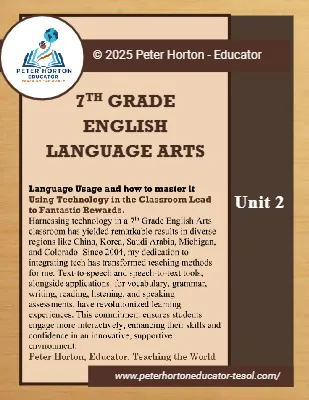8th English Language Arts Unit 14
Unlocking Language: Methods for Vocabulary Mastery
Building vocabulary by using diverse strategies, therefore, enhances comprehension and communication. For instance, methods include word maps, flashcards, and contextual learning. Moreover, engaging in reading, writing, and discussion helps reinforce new words. As a result, benefits include improved reading and writing skills, better understanding across subjects, and increased confidence in using language. For example, using a word map for “benevolent” helps students grasp its meaning, synonyms, and usage. Ultimately, embracing various techniques makes learning dynamic and effective, thereby fostering a lifelong love for words.
Unit 14: Vocabulary Development
The Benefits of Building a Large Vocabulary
A Guide to Enhancing Language Skills and Unlocking New Horizons
Introduction
Imagine walking into a room filled with treasures. Each word you learn is like finding a new gem, unlocking a door to endless possibilities. For 8th grade students, building a large vocabulary is not just about learning new words; rather, it is about expanding your world, improving your communication skills, and setting the stage for future success. In this guide, we will explore the myriad benefits of building a large vocabulary. Specifically, we will use descriptive, informative, creative, and engaging language tailored to your level and interest. Moreover, we will provide numerous examples and scaffold the learning process to ensure you grasp the importance of a rich vocabulary.
Enhanced Communication Skills
Expressing Yourself Clearly
To begin with, one of the primary benefits of building a large vocabulary is the ability to express yourself more clearly and effectively. When you have a vast array of words at your disposal, you can choose the perfect word to convey your thoughts and feelings. For example, instead of saying, “I’m happy,” you could say, “I’m ecstatic,” “I’m overjoyed,” or “I’m thrilled.” Thus, each of these words conveys a slightly different shade of happiness, allowing you to express your emotions more precisely.
Engaging in Meaningful Conversations
In addition, a rich vocabulary enables you to engage in more meaningful and interesting conversations. Because you know more words, you can discuss a wider range of topics and share your ideas more effectively. For instance, if you’re discussing a book you just read, instead of saying, “It was good,” you could say, “It was captivating,” “It was thought-provoking,” or “It was a page-turner.” Consequently, these words not only convey your enthusiasm but also make the conversation more engaging for others.
Persuasion and Influence
Furthermore, having a large vocabulary can enhance your ability to persuade and influence others. When you can articulate your arguments clearly and eloquently, you are more likely to convince others of your point of view. For example, if you’re writing an essay on why recycling is important, using words like “sustainable,” “environmentally friendly,” and “conservation” can strengthen your argument and make it more compelling.
Improved Academic Performance
Reading Comprehension
Another major benefit of vocabulary development is improved reading comprehension. Often, unfamiliar words can disrupt your understanding of the text. However, with a large vocabulary, you are more likely to recognize and understand these words, making reading a smoother and more enjoyable experience. For example, if you’re reading a science textbook and come across the word “photosynthesis,” knowing that it means the process by which plants convert sunlight into energy can help you understand the entire passage.
Writing Skills
Similarly, building a large vocabulary improves your writing skills. Since you know more words, you can choose the most appropriate ones to convey your ideas clearly and effectively. This way, your writing becomes more interesting and engaging. For instance, instead of writing, “The cat is very big,” you could write, “The cat is enormous,” “The cat is gigantic,” or “The cat is colossal.” Thus, these words paint a more vivid picture in the reader’s mind.
Standardized Tests
Moreover, a robust vocabulary is beneficial for standardized tests, which often include sections on reading comprehension and writing. Indeed, knowing more words can help you understand the questions better and answer them more accurately. For example, if a test question asks you to “analyze” a passage, knowing that “analyze” means to examine in detail can help you approach the question correctly.
Enhanced Cognitive Skills
- Critical Thinking
Beyond academics, building a large vocabulary enhances critical thinking skills. Because you know more words, you can analyze complex ideas more effectively. As a result, this allows you to think more deeply about various topics. For example, if you’re studying history and come across the word “tyranny,” knowing that it means oppressive rule can help you better understand historical figures’ actions and motivations. - Problem-Solving
In the same way, a rich vocabulary aids in problem-solving. When you can articulate a problem clearly, you are better equipped to find solutions. For instance, if you’re working on a group project and someone says, “We have a problem with our presentation,” knowing words like “organization,” “clarity,” and “engagement” can help you pinpoint and address specific issues. - Memory and Learning
Additionally, learning new words and building a large vocabulary can improve your memory and overall learning ability. Each time you encounter and use new words, you strengthen your brain’s neural connections. Therefore, recalling information becomes easier. For example, if you learn the word “metamorphosis” and use it in different contexts, you are more likely to remember and understand it.
Broadened Horizons
- Exploring New Ideas Likewise, a large vocabulary opens up new horizons by allowing you to explore a wider range of ideas. Because you know more words, you can comprehend more complex texts and broaden your perspective. For instance, if you’re interested in astronomy, knowing words like “constellation,” “nebula,” and “quasar” can help you delve deeper into the subject.
- Connecting with Diverse Cultures
In addition, vocabulary development enables you to connect with diverse cultures. Since language is a key aspect of culture, knowing cultural words enhances your understanding. For example, learning about Japanese culture is enriched when you understand words like “kimono,” “sakura,” and “origami.” - Personal Growth and Confidence
Finally, building a large vocabulary contributes to personal growth and confidence. Indeed, when you know more words, you feel more capable of expressing yourself. Consequently, this confidence positively impacts academics, social life, and beyond.











